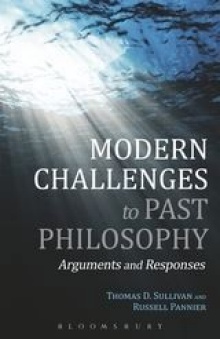Capen Lecture Series 2016: Philosophy and Its History
Thomas Sullivan and Russell Pannier
Philosophical Historiography—A Symposium for Speakers

On this page:
Symposium Abstract
Near the beginning of the twentieth century, celebrated quantum physicist Niels Bohr confided to a friend that he had “made a discovery, a very great discovery.” It wasn’t in physics. “All that philosophers have ever written is pure drivel."
Half a century later, Hans Reichenbach argued rather more generously, but to the same overall effect, that philosophers writing before Bohr, Einstein, and other scientific revolutionaries who changed the world picture could be credited with raising important questions about the structure of the physical world and entities within it— but never with answering them. The means at their disposal were inadequate to the task. Reichenbach pointed to Kant, who built his theoretical philosophy on the foundations of the Newtonian physics of absolute space, time, and determinism in nature, with the result that the philosopher, who is considered by many to be the greatest of all time, “has nothing to say to us who are witnesses of the physics of Einstein and Bohr.”
Now, another half century later, Stephen Hawking and Leonard Mlodinow announce that philosophy “is dead,” since philosophers have failed to keep up with developments in science. According to these eminent physicists, “scientists have become the bearers of the torch of discovery in our quest for knowledge."
Why in the world should anyone but a student of the history of ideas ever look back at theories postulating that everything is ultimately earth, water, re, or air? Or at the speculations of medieval or early modern thinkers who were not much closer to the truth. If you want to know how the world is constituted, why not read Atkins or other prominent chemists and physicists? Even with respect to normative issues such as altruism, love and violence, do any of these look the same since Darwin?
One might expect philosophers to rise to the challenge. A few do. But many believed there is no moving forward without using the modern analytical tools on narrow questions of the moment. Thomas Sullivan's presentation will take on the scientistic challenge, Russell Pannier’s the philosophic. Along the way, they will spell out an idea of philosophy encompassing all the sciences and arts.
About the Speakers
Thomas D. Sullivan, University of St. Thomas
“Philosophy Unshackled”
Russell F. Pannier, William Mitchell College of Law
“Burying the philosophical past: Reflections on the endlessly recurring philosophical impulse to start all over again”
Sullivan's Areas of Expertise: Metaphysics, Ethics, Aquinas, Philosophy of Religion.
Pannier's Research and Scholarship: Working on a book on Aquinas’s metaphysics, a book on Aquinas’s moral and legal philosophy, and a system of deontic logic.
Thomas Sullivan is Professor of Philosophy Emeritus, and before his recent retirement held the Aquinas Chair in Philosophy and Theology, at the University of St. Thomas, St. Paul, USA. He is the co-author, with Sandra Menssen, of The Agnostic Inquirer: Revelation from a Philosophical Standpoint (2007).
Russell Pannier is Emeritus Professor of Law, William Mitchell College of Law, USA. He has published in the areas of philosophy of logic, metaphysics, jurisprudence, ethics, constitutional law, philosophy of religion, and decision theory. He has published several essays on some of those topics with Thomas D. Sullivan
Sullivan and Pannier are co-authors of Modern Challenges to Past Philosophy (2014), a study designed to show how and why understanding earlier works of some of the most penetrating minds ever to ponder eternally valid questions can contribute to a renewal of our own culture.
Lecture Materials
Podcast of Lecture: Russell Pannier
- Lecture Audio: "Philosophy Unshackled"
















